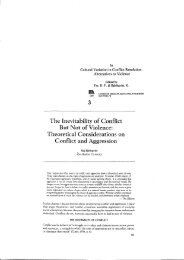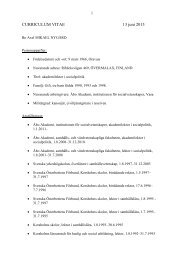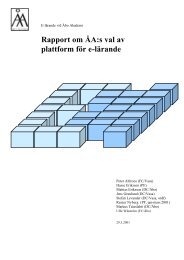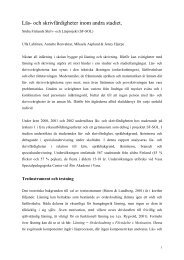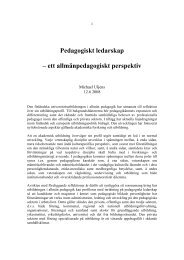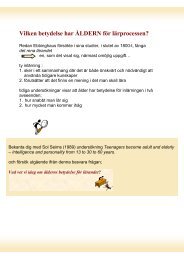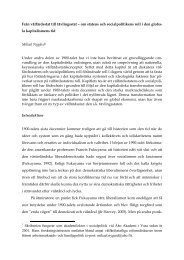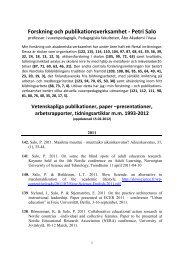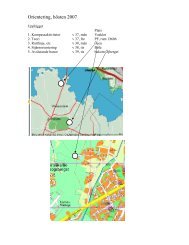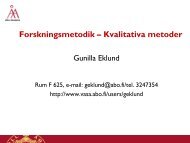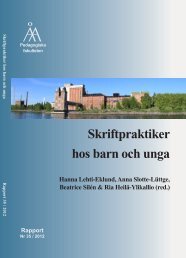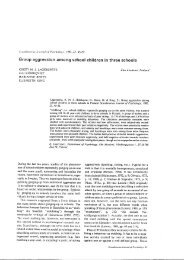Parties, Candidates and Citizens On-Line - Åbo Akademi
Parties, Candidates and Citizens On-Line - Åbo Akademi
Parties, Candidates and Citizens On-Line - Åbo Akademi
You also want an ePaper? Increase the reach of your titles
YUMPU automatically turns print PDFs into web optimized ePapers that Google loves.
these scholarly visions (e.g. Corrado & Firestone 1997; Rash 1997), Margolis <strong>and</strong><br />
colleagues (Margolis et al. 2003, 58) state that the equalization theory contains the<br />
following core argument:<br />
“…the advent of the internet, seen initially as a democratic force, led to<br />
expectations that information <strong>and</strong> communications technologies (ICTs) might<br />
disproportionately benefit fringe <strong>and</strong> minor parties thus assisting the growth<br />
of anti-establishment parties […] the lack of editorial control <strong>and</strong> relative low<br />
cost of creating a website meant that minor political movements could<br />
establish a platform for their view more easily than in the mainstream media<br />
<strong>and</strong> could reach a considerably larger audience. In short, the internet could<br />
help level the electoral playing field” (Margolis et al. 2003, 58)<br />
The internet lowers the costs of publishing large-scale information <strong>and</strong> multimedia via<br />
political websites. It also provides senders of political messages with the ability to<br />
maintain control of the conveyed message without editorial intervention (e.g. Carlson &<br />
Djupsund 2001, 69; Coleman & Goetze 2001, 5; Hill & Hughes 1998, 22; Margolis et al<br />
2003, 58). These particular features of the internet provide potential benefits to all<br />
political actors. These benefits, however, ought to be relatively more central for the fringe<br />
<strong>and</strong> minor political actors who, in many cases, find it difficult to stay in stride with the<br />
major actors via traditional communication channels (cf. Margolis et al. 2003, 58; Norris<br />
2001b, 170; Sadow & James 1999, 5). These actors would now be able to compete on<br />
more equal terms with their major counterparts than via campaigning in traditional massmedia.<br />
There are some empirical findings which lend support to the equalization theory<br />
which merit attention here. Norris (2003, 42-43) concludes that her cross-national analysis<br />
of 134 party websites in the EU countries indicated that the smaller parties’ websites did<br />
give them more “voice <strong>and</strong> visibility” than these parties had received via traditional media.<br />
Newell’s (2001, 81-82) analysis of Italian party websites revealed that the smaller parties<br />
appeared more inclined to turn to the ‘new’ medium than their major counterparts. Cunha<br />
<strong>and</strong> colleagues (Cunha et al. 2003, 87-88) also argue that their findings concerning party<br />
websites in Italy, Greece, Spain <strong>and</strong> Portugal, facilitate “party-competition levelling”.<br />
Tkach-Kawasaki even states that: “the Internet is clearly opening up new channels for<br />
smaller parties, c<strong>and</strong>idates, interest groups…” (Tkach-Kawasaki 2003, 118). Other<br />
scholars have noted the tendency of smaller party c<strong>and</strong>idates to use the internet at a<br />
higher rate than major party c<strong>and</strong>idates (e.g. Herrnson & Stokes 2003; Sadow & James<br />
1999).<br />
Contrary to the situation depicted in the equalization theory, scholars have put<br />
forward a “normalization” theory. According to this theory, the internet will merely<br />
produce a “no-change” situation in regards to its impact on the electoral competition<br />
12



